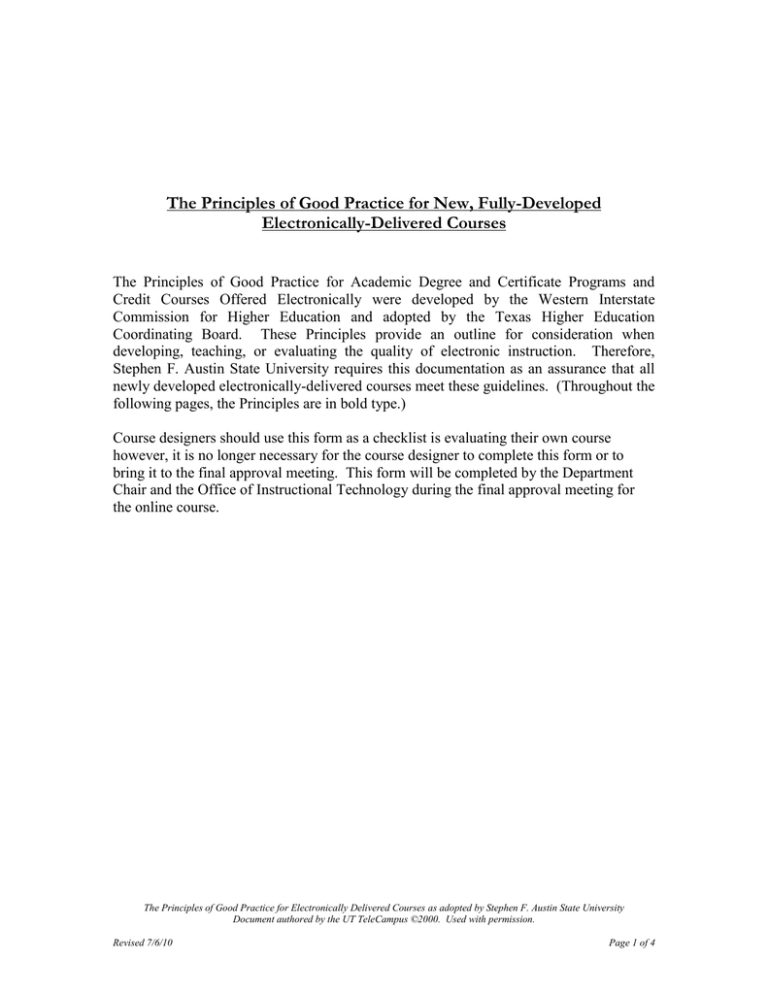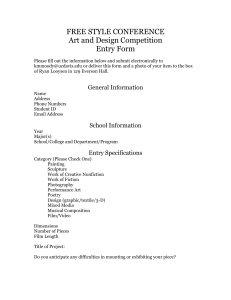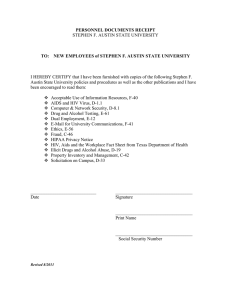The Principles of Good Practice for New, Fully-Developed Electronically-Delivered Courses
advertisement

The Principles of Good Practice for New, Fully-Developed Electronically-Delivered Courses The Principles of Good Practice for Academic Degree and Certificate Programs and Credit Courses Offered Electronically were developed by the Western Interstate Commission for Higher Education and adopted by the Texas Higher Education Coordinating Board. These Principles provide an outline for consideration when developing, teaching, or evaluating the quality of electronic instruction. Therefore, Stephen F. Austin State University requires this documentation as an assurance that all newly developed electronically-delivered courses meet these guidelines. (Throughout the following pages, the Principles are in bold type.) Course designers should use this form as a checklist is evaluating their own course however, it is no longer necessary for the course designer to complete this form or to bring it to the final approval meeting. This form will be completed by the Department Chair and the Office of Instructional Technology during the final approval meeting for the online course. The Principles of Good Practice for Electronically Delivered Courses as adopted by Stephen F. Austin State University Document authored by the UT TeleCampus ©2000. Used with permission. Revised 7/6/10 Page 1 of 4 The Principles of Good Practice for Electronically-Delivered Courses Course and Designer Information Course prefix, number, and title: Title and Name of Course Designer: Program or Degree: Name of School or Department: Signatures of Approval By signing below, I declare that I have duly inspected this course and hereby warrant that this course meets the standards of the Principles of Good Practice, and is hereby approved to be offered as an electronically-delivered course. Course Designer(s) Date Department Chair Date Office of Instructional Technology Date The Principles of Good Practice for Electronically Delivered Courses as adopted by Stephen F. Austin State University Document authored by the UT TeleCampus ©2000. Used with permission. Revised 7/6/10 Page 2 of 4 Department Chair’s Checklist 1. The course is consistent with the institution’s role and mission to provide an educational opportunity to all students. Yes No 2. Academic standards for all programs or courses offered electronically will be the same as those for programs or courses delivered by other means at the institution where the program or course originates. Yes No 3. Qualified faculty members provide appropriate oversight of the program or course that is offered electronically. Yes No 4. Students will be given an opportunity to evaluate this online course. Yes No 5. Results of the course evaluation will be used to revise the course. Yes No 6. The course results in learning outcomes appropriate to the rigor and breadth of the degree or certificate awarded. Yes No 7. The course provides for appropriate interaction between faculty and students and among students. Yes No 8. Student achievement in the course will be assessed. Yes No 9. The course offered electronically is coherent and complete. Yes No Course Prefix, Number, and Title Department Chair Initials The Principles of Good Practice for Electronically Delivered Courses as adopted by Stephen F. Austin State University Document authored by the UT TeleCampus ©2000. Used with permission. Revised 7/6/10 Page 3 of 4 Office of Instructional Technology’s Checklist 1. The institution provides faculty support services specifically related to teaching online…………….…….….… Yes No 2. The institution assures appropriate training for faculty who teach via the use technology …………..…………….… Yes No 3. Through a Getting Started module students are provided with clear, complete, and timely information on: -- syllabus with course goals, requirements and assessments….. Yes -- nature of faculty/student interaction……………………….… Yes -- acquiring texts and materials……………………………..….. Yes -- Link to SFAONLINE for Student Services and tech support. Yes -- Link to Online Orientation for tech requirements and skills…. Yes 4. The course offered electronically is coherent and complete. -- uses SFA supported LMS…..……………..…………….……. Yes -- timeline of requirements, assignments, and assessments…..… Yes -- content modules with clearly defined components including: -- introduction and objectives for each lesson ………………... Yes -- content or lecture materials generated by the instructor…… Yes -- readings……………………………………………..……… Yes -- activities/practice ……………………………………..…… Yes -- dialogue and interactions………………………………....... Yes -- assessments (quizzes, exams, tests, presentations)…...……. Yes -- conclusion or summary…………………………..…...……. Yes -- all content modules are complete and online……………… Yes 5. The course materials meet legal requirements. -- all course materials meet ADA guidelines ……………………Yes -- copyright laws are followed throughout the course………..… Yes Course Prefix, Number, and Title No No No No No No No No No No No No No No No No No OIT Initials The Principles of Good Practice for Electronically Delivered Courses as adopted by Stephen F. Austin State University Document authored by the UT TeleCampus ©2000. Used with permission. Revised 7/6/10 Page 4 of 4



